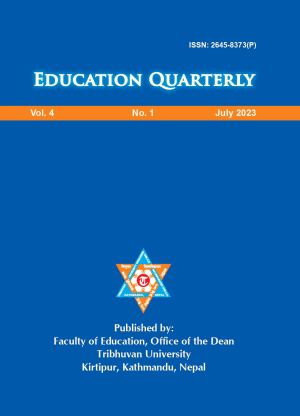Predicting Smokeless Tobacco Consumption Behavior of Adolescent Students Through Protection Motivation Theory
DOI:
https://doi.org/10.3126/jeqtu.v4i1.57242Keywords:
Coping appraisal, extrinsic reward, intention, response efficacy, threat appraisalAbstract
Smokeless tobacco, a type of tobacco product that is consumed without burning, is detrimental to health but its consumption among youths of Nepal is increasing. In this regard, the main purpose of this paper is to predict SLT consumption behavior of students based on protection motivation theory (PMT), which is mostly used to study health related protective behaviors. For this study, descriptive research design was followed. Adolescent students of Class 9 and 10 of community schools of Siraha districts comprised the population of the study and the sample was selected by applying multiple-cluster sampling method. Although the sample size was 240, which was determined by using Yamane formula, only data of 225 students were analyzed due to discarding 15 incomplete questionnaires. Anonymous questionnaire was the tool of data collection that contained behavioral, socio-demographic and PMT scale sections. Data were collected through enumerators. The study found that threat appraisal was significant predictor of SLT consumption behavior of students and their intention to consume it. It is concluded that higher proportion of students consumes SLT that should be minimized by developing and implementing tobacco cessation policies and programs based on threats related to its consumption at local and national level.




